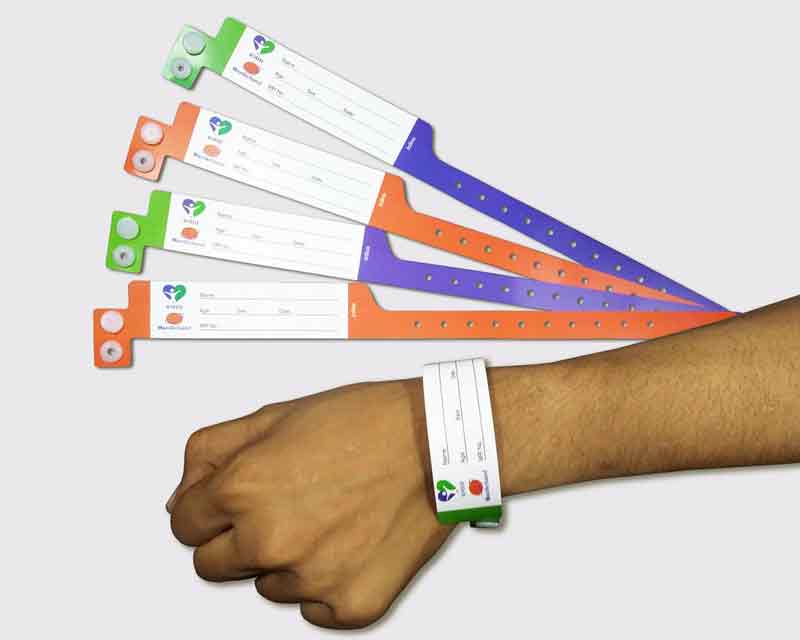Why Investing in a Top-Notch Patient Identification Band is Crucial for Medical Institutions
Why Investing in a Top-Notch Patient Identification Band is Crucial for Medical Institutions
Blog Article
Discovering the Different Kinds of Patient Identification Band Used in Clinical Facilities
In the complex world of medical care, the essential duty of Patient Identification bands often goes undetected. These bands, differing from basic paper wristbands to advanced RFID bands, form the backbone of Patient safety and security methods, ensuring precision in Patient Identification.
Comprehending the Value of Patient Identification Bands
While they might appear like plain devices, Patient Identification bands play an essential function in medical facilities. These bands offer as a crucial device for verifying Patient identification, avoiding clinical errors related to misidentification. Patient Identification bands likewise help in enhancing management jobs, guaranteeing accurate record-keeping and billing.
Traditional Paper Wristbands: Their Use and Limitations
Standard paper wristbands have actually been a staple in Patient Identification across various clinical facilities. While their use prevails, they nurture particular restrictions that might influence their efficiency in Patient monitoring. This area will focus on the range of their application and the fundamental drawbacks linked with their usage.
Paper Wristbands: Usage Range
In the realm of Patient Identification, paper wristbands have long held a vital function. These bands are generally used in outpatient settings, where the Patient's remain is momentary. Regardless of innovations in modern technology, the modest paper wristband remains a cost-effective and trusted option for Patient Identification in various healthcare circumstances.
Limitations of Paper Wristbands
Despite their widespread usage, paper wristbands are not without their disadvantages. In enhancement, paper wristbands usually do not have the technical capacities of more modern choices, such as barcoding or RFID chips, restricting their capability to merely showing written details. Paper wristbands can trigger discomfort or skin irritation to some patients, specifically when worn for extended periods.
Barcoded Wristbands: Innovations in Patient Identification
While Patient Identification has long been an essential element of health care, the advent of barcoded wristbands symbolizes a significant leap onward. These bands utilize the simpleness of barcoding modern technology, permitting for Patient info to be quickly scanned and accessed. They enhance the speed and precision of Patient Identification, minimizing the risk of medical errors associated to misidentification.
Superhigh Frequency Identification (RFID) Bands: a Step In The Direction Of Futuristic Healthcare
The development of Patient Identification bands has actually brought concerning the introduction of Superhigh frequency Identification (RFID) Bands (patient identification band). These cutting-edge tools existing crucial benefits for health care centers, providing a much more efficient and technologically advanced methods of Patient Identification. The implementation of RFID in healthcare is a substantial step towards a more advanced approach to Patient administration and safety and security
Understanding RFID Bands

RFID Bands: Key Benefits
Mainly, these bands boost Patient safety and security by offering exact, instant Identification, consequently minimizing medical mistakes. RFID bands can save a vast quantity of Patient information, including clinical history and allergies, making it possible for customized care. Generally, RFID bands represent a substantial advancement in Patient Identification modern technology, benefiting both patients and healthcare suppliers.
Implementing RFID in Medical Care
As we tip right into a technologically advanced era, the implementation of RFID bands in medical care becomes increasingly important. These bands offer a seamless method to track and recognize clients, guaranteeing their safety and boosting performance in treatment procedures. RFID go to the website bands offer numerous benefits over standard Identification approaches. They can save a substantial quantity official site of information, consisting of the Patient's clinical background and therapy strategies, which can be quickly accessed by medical care providers. This information aids physicians make educated decisions pertaining to the Patient's treatment strategy. Furthermore, RFID bands reduce medical mistakes by providing precise Patient Identification, which is vital in avoiding misdiagnosis or incorrect medicine administration. Hence, the execution of RFID bands is a substantial action towards enhancing Patient safety and security and healthcare distribution.

Color-Coded Wristbands: Helping in Quick and Accurate Medical Diagnosis
In the bustling environment of a clinical center, color-coded wristbands have actually arised as vital tools for swift and precise Identification of an individual's medical problem. These wristbands, used by people, bring specific colors that correspond to different clinical conditions or conditions. This system is designed to supply instant visual cues to health care carriers, boosting Patient safety and care quality.
Methods for Effective Implementation and Management of Patient ID Bands
Attaining optimal usage of Patient Identification bands demands a well-structured approach for their execution and management. The primary step involves training all health workers on the significance of properly applying and reading these bands. Second of all, medical facilities must systematize the usage of ID bands throughout all divisions, guaranteeing uniformity and reducing disparities. Routine audits ought to be conducted to validate adherence to plans and to remedy any type of incongruities. Patient education is additionally crucial; individuals must recognize the function of the bands and the requirement for their consistent wear. patient identification band. It's vital to have a back-up plan in area, such as barcode scanning or biometrics, to make certain that Patient Identification is never ever compromised.
Final thought
Patient Identification bands are important in medical centers to ensure safety and accuracy. Efficient implementation and administration of these bands can substantially minimize clinical mistakes, improve efficiency, and enhance general Patient care.
These bands, differing from basic paper wristbands to innovative RFID bands, create the news foundation of Patient safety procedures, ensuring precision in Patient Identification.The development of Patient Identification bands has actually brought about the appearance of Radio Frequency Identification (RFID) Bands. Generally, RFID bands represent a significant innovation in Patient Identification innovation, benefiting both clients and healthcare service providers.
RFID bands decrease medical errors by offering precise Patient Identification, which is crucial in stopping misdiagnosis or incorrect medicine administration. Patient education is additionally vital; patients have to comprehend the purpose of the bands and the requirement for their continuous wear.
Report this page